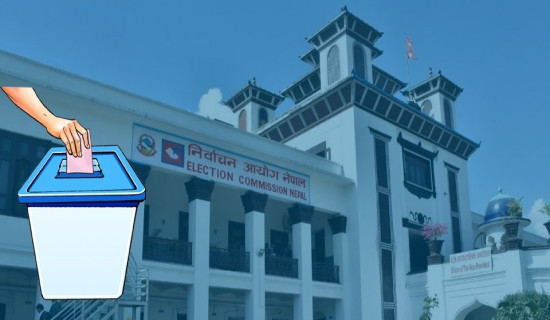- Sunday, 1 March 2026
Animal sacrifice in Dashain rituals
By Binu Shrestha & Aashish Mishra
Kathmandu, Oct 3 : The mass sacrificial ceremony is specially organised at the Taleju Temple of Hanuman Dhoka of Kathamndu, Patan and Bhaktapur to offer to the goddess during Maha Ashtami and Maha Nawami.
Pension Management Office (PMO) and Guthi Sansthan have provided four-leg and two-leg animals to sacrifice them in the name of goddesses across the nation.
As per the tradition, PMO manages 162 he-buffaloes and 187 he-goats to sacrifice during 15-day Dashain festival.
Raj Bahi Shrestha, information officer of PMO, said that mass sacrificial ceremony is organiased at the Mul Chowk of Hanumandhoka, then other areas to worship Taleju Bhawani.
From the day of Ghatasthapana to Maha Nawami, each day he-goats are sacrificed, with total nine he-goats sacrificed during the period.
On Maha Nawami day, eight he-goats are sacrificed in the morning during special worshipping time and 54 he-goats, 54 he-buffaloes and a duck are sacrificed in evening.
After the sacrifice of eight he-goats in special worshipping time in the morning of Maha Nawami, 54 he-goats, and 54 he-buffaloes are sacrificed in the morning. On the day of Chaturdashi, same mass sacrificial ceremony is organsied offering 54 he-goats, and 54 he-buffaloes.
According to him, around 60 to 65 four-leg and two-leg animals are provided to sacrifice at several other goddess temples.
It has allocated Rs. 120 million each year to manage animals during the whole year.
PMO provides 17 he-goats, seven he-buffaloes and 18 ducks for mass sacrificial ceremony at Nuwakot Palace during Ashtami and Nawami day, said Shrestha.
Janak Pokahrel, spokesperson of Central Guthi Santhan, said that 50 he-buffaloes, 14 ducks and 24 sheep are provided under the Rajguhti for Taleju Bhagawati of Hanumandhoka.
Bhaktapur-based Taleju Temple with other Shakti Peeths, it has been provided 37 he–buffaloes, 86 he–goats, 29 ducks and two hens and one he-buffalo and 46 he-goats are provided for Lalitpur Taleju Bhagawati and other goddesses.
In Pashupati area, it has provided 12 he-goats, four he-buffaloes and eight ducks to sacrifice at Guheshwori, Rameshwori, Kulanandajha along with other temples.
In Kavrepalanchowk, 10 he-goats, eight he-buffaloes, three sheep, eight ducks and 13 hens are provided to sacrifice to Kavrepalanchowk Bhagawati, Chandi along with other temples.
Moreover, eight he-goats are provided at Janakpur to offer sacrifice at Rajdevi, Jaleshwor, Fuleshwor Mai, Rajdevi and other temples.
Guthi Sansthan is provided Rs. 84 million every year to manage puja items and buy four-leg and two-leg animals.
“We kept only Kathmandu-based record of animals which are used in sacrificial ceremony but send cash amount in some parts outside the valley and district Guthi office. So, this is not full information about animals’ sacrificial ceremony across the nation.
Animal sacrifices, as well as the sacrifice of foodgrains and various other items, are considered an important part of worship in several religions including Hinduism.
See Page 6
And, during Dashain, animals like male goats and buffaloes are sacrificed at various temples and shrines in Kathmandu Valley and other parts of the country.
However, Shiva Shyam Sharma, priest and a member of Patan’s Mani Chhén Brahman clan that attends to the worship of the Lichhavi-era goddess Shreemanmaneshwori in the city, urged people to not mischaracterise it as an act of senseless violence.
“It’s an act of liberation,” he said. “We pray for the salvation of the sacrificed animal and for it to find a place in heaven.”
Further, Shiva added that any sacrifice could only be performed with the permission of the animal. It has to be made aware that it is going to be killed and its consent obtained in a ritual known in Nepali as ‘Parsinu’. “Sometimes, the animal does not give permission and we leave them be.”
His son Shivesh, who is also a priest, felt that sacrifices also held an ecological meaning. “Goats and buffaloes are domesticated beasts that are not part of the natural food chain. Thus, offering them to deities may have been devised as a way to keep their population in check.” Animal sacrifices are not mandatory in Hinduism though, and people may also offer Winter Melon, Stone Apple, Sponge Gourd, Coconut, Rice Pudding or Roti to their goddesses.





-square-thumb.jpg)





-original-thumb.jpg)
-original-thumb.jpg)


